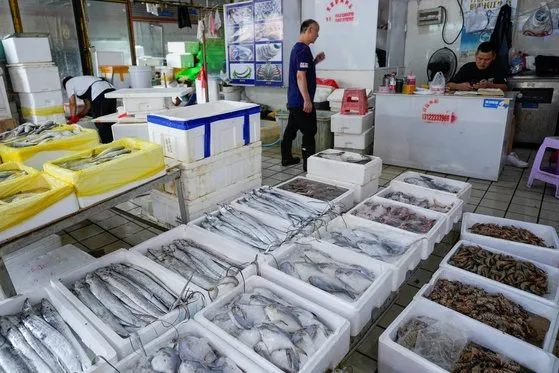China's Seafood Frenzy Amidst Fukushima's Radioactive Waters
 |
| Iodine Consumption and Radioactive Fallout Fears Drive Unprecedented Seafood Sales in China |
In the aftermath of Japan's Fukushima Daiichi Nuclear Power Plant's decision to release contaminated water into the ocean, an unexpected outcome has unfolded in the Chinese seafood market. Online retailers have reported a significant surge in the sales of Chinese seafood, with items like fish, sea cucumbers, and crabs seeing sales increase by over 100%. A newfound belief that "consumption of potassium iodide helps eliminate internal radiation" has led to a surge in internet searches for related keywords in China. Furthermore, concerns surrounding the radioactive water release have triggered a "salt hoarding" phenomenon in Hong Kong and Macau.
On the 27th, according to China's e-commerce site "Pinduoduo," sales of various Chinese seafood products have surged by over 100%, with fish, shrimp, and sea cucumber sales rising by 148%, 130%, and 118% respectively. The seafood market has been turbulent, with prices of certain products fluctuating dramatically. For instance, the price of flower crabs from Zhoushan, China, which had dropped after the fishing ban ended, skyrocketed following Japan's water release, resulting in a 122% increase in sales.
Experts attribute this trend to China's strong criticism of Japan's water release, leading to a complete ban on Japanese seafood imports. However, some observers speculate that this reaction might have deeper implications, as fears grow about the long-term impact of Japan's radioactive water on China's seafood industry.
Chinese fishermen are concerned about their livelihoods, as a study from the Ocean Engineering Research Institute at Qinghua University suggests that Fukushima's contaminated water could reach China's coastal waters within 240 days. The uncertainty has triggered worries among the fishing community, with fears that even months after Japan's water release, China's seafood could still be affected.
In Hong Kong and Macau, the fear of contamination has led to "salt hoarding." Reports indicate that after Japan's water release, panic buying of salt occurred, with supermarkets experiencing shortages. Rumors that iodized salt can help counteract radiation exposure further fueled the hoarding. To address these concerns, the Hong Kong Food Safety Center issued a statement clarifying that there is no scientific basis to suggest that salt consumption can protect against radiation-induced harm.
Although theoretically, consuming iodine-rich foods like potassium iodide can help eliminate excess radioactive iodine from the body, it's important to note that this principle applies only to radioactive iodine exposure. Excessive consumption of potassium iodide can lead to adverse effects, as stated by the World Health Organization (WHO).
While Japan's radioactive water release has caused upheaval in China's seafood market and ignited public fears, it remains essential for authorities to provide accurate information to prevent unwarranted panic. As the situation unfolds, the implications for the seafood industry and the relationship between China and Japan are yet to be fully understood.



댓글
댓글 쓰기